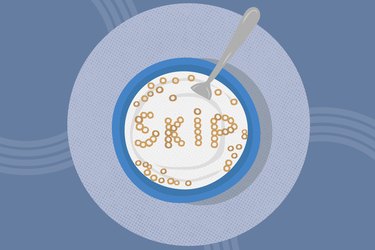
To many of us, the idea of skipping "the most important meal of the day" is blasphemous. Who would willingly give up breakfast?
A lot of people, it turns out: The popularity of intermittent fasting methods — notably 16:8 fasting, which calls for 16 hours of fasting followed by an eight-hour window of eating each day — has led to more and more people fasting overnight and hopscotching right over breakfast.
Video of the Day
Video of the Day
Budding research suggests this kind of eating pattern might be linked to lower risks for cancer and obesity, but it also seems to go against the nutrition advice we've heard for decades. So, who's right? The breakfast-lovers or the intermittent fasters?
For our Ask the RDs series, we asked readers to send us their biggest nutrition questions and then posed the 12 most common to a panel of registered dietitians. Many readers were confused about the importance of breakfast vs. the potential benefits of intermittent fasting. Here's what the experts had to say.
Is Skipping Breakfast During Intermittent Fasting Safe?
"The theory that breakfast is the most important meal of the day applies to a lot of people. Everyone essentially fasts overnight. You're breaking your fast with breakfast, and most people feel best when they start their day with some calories and nutrients to kick their energy into gear. But some people don't need to eat right away.
It's a little polarizing, because I'm sure you have people in your life who have just a cup of coffee and don't eat until noon. Whereas some of us wake up and we're ravenous and really want to eat something right away.
That's what people need to understand the most about nutrition: It's so individualized that what works for someone and makes someone feel amazing might not work for the person next to them. You have to be in tune with what makes you feel best versus what trend everyone else is talking about.
Intermittent fasting gives some people structure. You have a start and a stop time, which can help people who might struggle with overeating.
On the other hand, if you have diabetes and need steady carbohydrates, intermittent fasting may not be for you. And for some people, intermittent fasting may not be a good fit for their work schedule. If you're a school teacher, for example, and you don't have time to just stop and eat, you might want to start your day with a hearty meal if you're not going to be eating again until 2 p.m."
"I think there are many reasons people skip breakfast. One, it's a timing issue, because very often in the morning, we're running out the door. It's easy to skip this meal because you don't want to take the time to put it together. The second reason is that a lot of people skip breakfast because they say 'I'm not hungry in the morning,' and it leaves room for them to have bigger meals later on.
Personally, I have seen that when people skip breakfast, it's a setup to have a bigger lunch or snacks.
Intermittent fasting where you don't eat from 8 p.m. to 8 a.m. the next day could just be called a good habit. But I don't think having one meal a day is very positive. I think hunger comes back with a vengeance."
"I would definitely be in the camp of 'Breakfast is important and you shouldn't skip it.' But also, many people have had luck with intermittent fasting and find it's a plan that works for them, whether for weight loss or lowering their cholesterol.
For some people, it's like, 'Wait a minute, I was already intermittent fasting. I wasn't eating breakfast and I was not eating anything after dinner.' For them, it's hardly a change.
But I would say for the average person, be a breakfast-eater, because that's where you can get all those nutrients we know people are falling short on, including fiber and fruit."
"Breakfast is very important. We wake up depleted. As a dietitian, I'm always recommending fueling for not only your day, but also sports performance. Many people go to the gym in the morning with nothing in their systems. You can feel weak and tired with low blood sugar.
On the same note, for people trying to lose weight, if they're not hungry, skipping breakfast could shave some calories from their day. The research is kind of 50/50 on that. I think it's a personal preference.
If someone has diabetes or a medical condition, they need to be careful of skipping meals because of low blood sugar levels. But for the average person who's trying to gain muscle and increase energy, I also think breakfast is important, especially if you exercise in the morning.
If someone's trying to lose weight and doing low- to moderate-intensity exercise, they could get away with skipping breakfast. But definitely those people who are exercising with moderate- to high-intensity, I would recommend having something in their stomach before they work out."
The Takeaway
Eating breakfast (or not) comes down to personal preference. While most of the RDs recommend eating breakfast as a healthy way to start your day and possibly prevent overeating later on, it's also fine to skip your morning meal if that's what works best for you; however, if you have a health condition like diabetes that's affected by low blood sugar or are in the habit of exercising in the mornings, it's a good idea to eat something before tackling the day.
Confused about nutrition? Get answers to more common questions in our Ask the RDs series.



